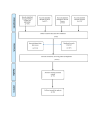Main Factors Affecting the Readiness and Responsiveness of Healthcare Systems during Epidemic Crises: A Scoping Review on Cases of SARS, MERS, and COVID-19
- PMID: 33753952
- PMCID: PMC7966936
- DOI: 10.30476/ijms.2020.87608.1801
Main Factors Affecting the Readiness and Responsiveness of Healthcare Systems during Epidemic Crises: A Scoping Review on Cases of SARS, MERS, and COVID-19
Abstract
Background: Given the significance of the preparedness and responsiveness of healthcare systems in relation to epidemics, this study aimed to determine their influencing factors during epidemic crises with a view to utilizing the findings in the battle against the coronavirus disease 2019 (COVID-19) outbreak.
Methods: This scoping study was conducted in 2020 via the Arksey and O'Malley approach. A systematic search was conducted on five online databases from January 2000 to June 15, 2020. Initially, 1926 English articles were retrieved based on their abstracts. After the screening process, 60 articles were considered for the final analysis. Data were charted by applying Microsoft Office Excel 2013 and were synthesized via thematic analysis.
Results: Five main factors have affected the responsiveness and preparedness of countries during the epidemics of severe acute respiratory syndrome (SARS), Middle East respiratory syndrome (MERS), and COVID-19: community-related interventions, managerial interventions, socioeconomic factors, the readiness of hospitals and health centers, and environmental factors. These themes are associated with 38 related sub-themes. The thematic framework shows that interactions between these five determinantes can affect the preparedness and responsiveness of healthcare systems during pandemics/epidemics.
Conclusion: According to the results, healthcare systems need to pay attention to their internal capacities, managerial interventions, and health centers to overcome the current pandemic. They should also consider such external factors as socioeconomic and environmental determinants that can affect their potential preparedness against pandemic/epidemic crises. Community-related interventions such as improvement of the community health literacy, teamwork, and social responsibility can enhance the readiness of healthcare systems against the COVID-19 outbreak.
Keywords: COVID-19; Coronavirus infections; Delivery of health care; Disease outbreaks; Severe acute respiratory syndrome.
Copyright: © Iranian Journal of Medical Sciences.
Figures


References
-
- Wan KH, Huang SS, Young AL, Lam DSC. Precautionary measures needed for ophthalmologists during pandemic of the coronavirus disease 2019 (COVID-19) Acta Ophthalmol. 2020;98:221–2. doi: 10.1111/aos.14438. [ PMC Free Article ] - DOI - PMC - PubMed
-
- Sohrabi C, Alsafi Z, O’Neill N, Khan M, Kerwan A, Al-Jabir A, et al. World Health Organization declares global emergency: A review of the 2019 novel coronavirus (COVID-19) Int J Surg. 2020;76:71–6. doi: 10.1016/j.ijsu.2020.02.034. [ PMC Free Article ] - DOI - PMC - PubMed
-
- Gilbert GL. Commentary: SARS, MERS and COVID-19-new threats; old lessons. Int J Epidemiol. 2020;49:726–8. doi: 10.1093/ije/dyaa061. [ PMC Free Article ] - DOI - PMC - PubMed
-
- Kinsman J, Angren J, Elgh F, Furberg M, Mosquera PA, Otero-Garcia L, et al. Preparedness and response against diseases with epidemic potential in the European Union: a qualitative case study of Middle East Respiratory Syndrome (MERS) and poliomyelitis in five member states. BMC Health Serv Res. 2018;18:528. doi: 10.1186/s12913-018-3326-0. [ PMC Free Article ] - DOI - PMC - PubMed
-
- Chen KT, Twu SJ, Chang HL, Wu YC, Chen CT, Lin TH, et al. SARS in Taiwan: an overview and lessons learned. Int J Infect Dis. 2005;9:77–85. doi: 10.1016/j.ijid.2004.04.015. [ PMC Free Article ] - DOI - PMC - PubMed
Publication types
MeSH terms
LinkOut - more resources
Full Text Sources
Medical
Miscellaneous
